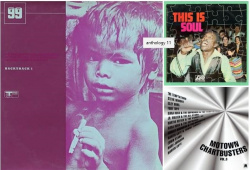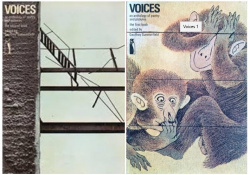In praise of poetry anthologies

I’m constantly reminded that I know a lot less about poetry (and everything else, too) than I’d like. At the same time, I’m wary of the business of keeping up with everyone else who’s busily ‘keeping up’. The contemporary poetry scene is, at its worst, a bubble, after all. It’s plagued by effusive reviews of work that is, at best, slight. Or, as Clive James described it, more acerbically, “slim volumes by the thousand … full of poetry … but few … with even a single real poem in them … at a time when almost everyone writes poetry but scarcely anyone can write a poem”.
Ouch! But on the other hand, I remember subscribing to Q magazine in the 90s, and being overwhelmed with the reviews of thousands of bands and musicians I’d never heard of , and probably never would again. The thing was, they were all discussed as if they were tremendously significant, and if everyone was so, then clearly, no one was.
I think that what I’m heading towards is the notion that you don’t need to ‘keep up’ and that you can be comfortable in the business of coming across poems and poets that have been around for some time, that have stood the test of time. You have no need to feel guilty about not having known them. I guess what prompted this was my last two posts about a poet who’s been around for nearly four decades and who I didn’t know because no one told me.
So here goes with a reworking of a post I wrote a couple of years ago. Poetry anthologies: all those books compiled by people who are happy to share what they know, and not patronise you while they’re doing it.

And I’m a bit like that about poetry, though that’s been changing over the last three or four years. Anthologies. That’s been my thing. Maybe that’s why I frequently go blank at poetry events when friends talk with great familiarity about poets I’m not sure I’ve heard of, and feel a bit gauche when poet friends post photographs of new collections they’ve bought in a retail frenzy at this or that poetry festival. So this week’s cobweb strand is in praise of anthologies and anthologists … or, at least, one particular anthologist. OK. Close your books, tidy your pens, sit up straight, look this way, remember it’s your own time you’re wasting and now …
…. let me take you back to 1972, when the then education secretary, one Margaret Thatcher of blessed memory, ordered a review of the teaching of English. It was the first of a long series of attempts (which grew more successful over the years) to take political control of the school curriculum, and of English in particular. What it produced was hardly what she hoped for. The report was A Language for Life (popularly known as the Bullock report), a generally humane and informed document, which you might have expected of Her Majesty’s Inspectorate. It’s taken Sats, league tables and Ofsted to put the kibosh on that kind of subversive leftie nonsense. What we have in its place is government ministers sounding off about how we should teach the history of the first world war, and what poetry should be force-fed to the children of Albion, and how.

Of course, we were offered books of poetry which contained no exercises, but generations of desperate pencilled marginal notes. Palgrave’s Golden Treasuries, and the deeply dispiriting, but jauntily alliterative Paths to Parnassus: The poet’s pageant. I remember the second one from the stock cupboards in my first teaching job. Exercises and heritage. Whose heritage was never in question. Probably not that of the lads I taught on my first teaching practice at Wharrier Street secondary modern school in Walker on Tyneside - alma mater to the great Eric Burdon, as it happens. So the question would arise. If you don’t want this stuff, what’ll take its place? All my secondary and university education in English Lit stopped dead round about 1916. I was well up on prose fiction, northern realists like Alan Sillitoe, Stan Barstow, John Braine, Keith Waterhouse, and I was totally sold on the short stories of Dylan Thomas. And I was shortly immersed in a golden age of children’s fiction. Alan Garner, Joan Aiken, Robert Westall, all of them. But I simply didn’t know enough poetry to offer an alternative to what seemed to be on offer. The Bullock report noted it was still a problem in 1972 : “The teacher is often faced with the task of showing that poetry is not some inaccessible form of utterance, but that it speaks directly to children, as to anyone else, and has something to say which is relevant to their living here and now. “
BUT
“It is exceptionally difficult for the individual teacher to keep abreast of all the new poetry that is published. Indeed, except for those with a particular interest in it there is often a time lag, so that the teacher is not aware of much of the work produced in the last two decades. A good anthology will do a great deal to introduce teacher and pupil alike to new and unfamiliar material, but it should not be a substitute for the extensive reading of poetry by the teacher himself.”
I remember reading that bit about anthologies not being a substitute for extensive reading. I didn’t know whether I felt guilty or indignant. Because what I believed then, and still believe, is that the best anthologies offer the shared experience of a committed enthusiast’s extensive reading. It’s taken me a long time to get round to standing up for anthologies. Too long.

And here’s the thing; they not only didn’t look remotely like school books, but they didn’t read like school books either. They were full of surprises, and, in the case of Junior Voices, they had stunning imagery in colour. They were books you could sit and browse, and every page brought a fresh surprise, if, like me and the rest of the teachers the Bullock report talked about, you didn’t know much about poetry and poets and poems (unless they were on O- and A-level syllabuses).


Now, it may well be that lots of you have had parallel experiences.
But before I go, I want to say a word about a different way of encountering an anthology. I’ve been going to Ann and Peter Sansom’s Poetry Business writing days for a good long time. In the process I realise they’ve assembled a very special anthology for me. Very often, a writing exercise will begin around, or from, a photocopied poem. I’ve religiously trimmed them down and stuck them in my workbooks so I know which poem triggered which draft or prose ramble. And now I have probably a couple of hundred, and in the process I’ve realised that these workshops have done for me now what Voices and Junior Voices and Worlds did, way back when. Without them I’d never have met Alison McVety, Thomas Lux, Billy Collins, Liz Berry, Martina Evans, Frank O’Hara, Tishani Doshi, Matthew Sweeney, Robert Van Dias, Claudi Jessop, Stewart Conn … and on and on it goes.
That’s what a great anthology is. The shared experience of folk who know more than you and who fill you with enthusiasm to know more than you do. To want more of the best of the best of. If that was all very teacherly, I guess it’s what I do. Certainly what I did for 40 years. Hard to shake off.
Next week we’ll be having a guest. As always, a special guest.






Jean Sheridan
Sat 3rd Aug 2019 20:12
Hi John - Anthologies - yay! The copy of Ten Twentieth Century Poets that I filched from Middlesbrough High is one of my treasured possessions - having become so familiar with many of the poems for O-level (I think it was), I could not bear to part from them! It contains the poem which is, even after 50 years (gulp!) my favourite - "The Lane" by Andrew Young. * sigh * Oh - and I've just ordered "Worlds" at your recommendation! Jean x